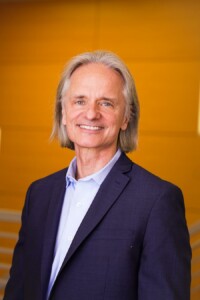2004 Early Career Investigator Grant Recipient — Oliver Dorigo, MD, PhD
Project Summary
Cancer cells grow due to a range of different mechanisms such as, the over-expression of oncogenes, or genes that cause cancer, or the shutdown of genes encoding tumor suppressors, or genes that stop cancerous growth. The PTEN gene encodes for a protein that suppresses cancer cell growth. Mutations of the PTEN tumor suppressor gene are seen in various malignancies, including brain, endometrial and ovarian cancer. Lack of PTEN results in the activation of a protein, called Akt, which then activates a variety of cell signals that lead to increased ovarian cancer cell growth. But in ovarian cancer cell cultures and animal experiments, inhibition of the Akt pathway, by over-expression of PTEN, results in significant slower tumor growth and cell death.
This project is designed to further elucidate the role of PTEN and the Akt pathways in ovarian cancer by studying Akt activity in the mouse ovary in an animal engineered to be missing the gene for PTEN. Based on previous observations in a prostate tumor model, Dr. Dorigo expects that activation of the Akt pathway in mouse ovarian tissue will result in significant molecular and cellular changes and possible ovarian tumor disease. He will also study changes in protein and gene expression using microarray technology, a method that allows the analysis of many genes simultaneously. The results from this study will provide insight into the Akt regulated signaling events in mouse ovary with the identification of possibly novel genes that are important in the pathogenesis of ovarian cancer.
Bio
Oliver Dorigo, MD, PhD, is the Director of the Division of Gynecologic Oncology at Stanford. He received hismedical degree from the University of Heidelberg Medical School in Germany. Following his MD degree, he underwent residency training in Obstetrics and Gynecology at the University of Munich, Germany. Dr. Dorigo then joined the Cancer Gene Therapy program at the Sidney Kimmel Cancer Center in San Diego, CA, andparticipated in early clinical trials using genetically modified tumor cell vaccines for the treatment of cancer. He subsequently completed his residency in Obstetrics and Gynecology at the UCLA David Geffen School of Medicine, Los Angeles, CA. He earned a PhD degree in Molecular Biology for his work on the development of a new genetransfer system that uses helper dependent adenovirus mediated delivery of an Epstein Barr Virus episome.
Dr. Dorigo completed a clinical fellowship in Gynecologic Oncology at UCLA/Cedars Sinai Medical Center, Los Angeles, CA. He was a faculty member in the UCLA Division of Gynecologic Oncology from 2005 to 2013. Dr. Dorigowas then appointed as the Director of the Stanford Gynecologic Oncology Service. At Stanford, he is directing the Clinical Research Group which is conducting clinical trials for gynecologic cancers that mainly involve immunotherapy.He is currently leading an international clinical trial that investigates the efficacy of a novel vaccine in recurrent, platinum-resistant ovarian cancer. Another trial is studying the clinical efficacy of an oncolytic virus delivered by cytokine induce killer cells in patients with ovarian and other cancers. Dr. Dorigo’s efforts are supported by the Stanford Cancer Institute and the Stanford Center for Cancer Cell Therapy. In addition, Dr. Dorigo directs the Gynecologic Oncology ClinicalCare Program at the Stanford Women's Cancer Center. His laboratory is focused on studying the role of macrophages in ovarian cancer.
Dr. Dorigo’s scientific work is published in various scientific journals, including Nature, Cell Development, Journal of Virology, Proceedings of the National Academy of Sciences, Journal of Immunology, Cancer Research, Communicationsbiology and Cancer Gene Therapy..
